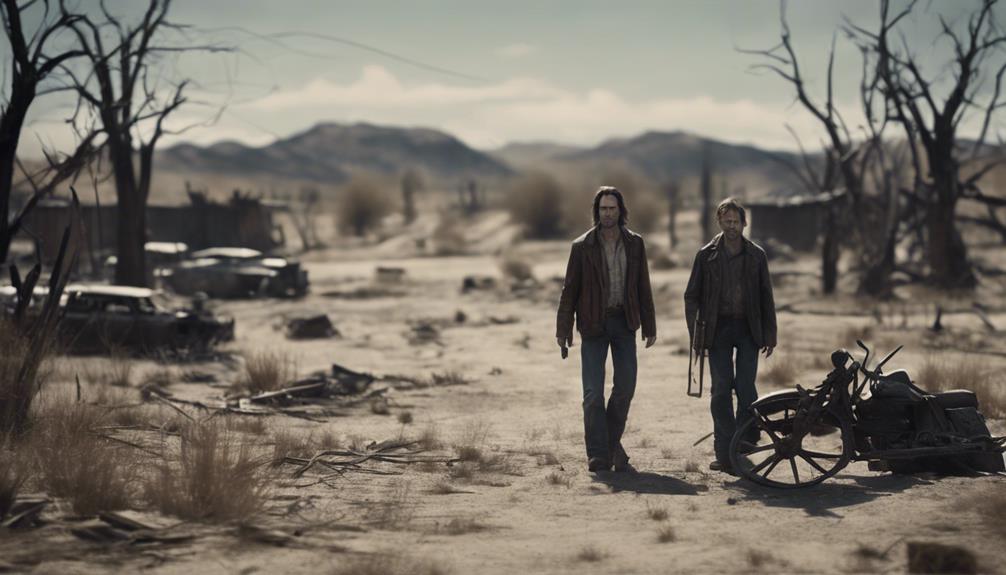Explore Stephen King's 'The Stand,' a riveting tale pitting good against evil in a post-apocalyptic world. Characters like Stu Redman and Randall Flagg embody complex moral dilemmas, while Mother Abigail symbolizes unwavering goodness. King's writing style immerses you in a vivid narrative, evoking a range of emotions from fear to hope. 'The Stand' impacts pop culture with its enduring themes and standout scenes. Discover King's inspiration and critical reception, solidifying this epic work in American literature. Get ready to uncover the layers of storytelling and character development that make 'The Stand' a timeless masterpiece.
Plot Overview
In Stephen King's 'The Stand,' the plot unfolds in three distinct parts, each exploring the outbreak of a deadly flu virus and the subsequent division of survivors into groups of good and evil. The flu, known as Captain Trips, decimates the population, leaving behind a world where the remnants of humanity must navigate the moral complexities of their new reality.
The central figure in this epic fantasy is Randall Flagg, a character embodying pure evil and leading the dark forces in the post-apocalyptic landscape.
As the narrative progresses, the story delves into character arcs that showcase the transformation and development of individuals as they grapple with the choices between good and evil. The clash between the groups led by Randall Flagg and those standing for righteousness forms the crux of the plot, driving the tension and drama forward in this sprawling tale of survival and morality.
Character Analysis
Let's explore the intricacies of the characters in 'The Stand' and their moral complexities. In Stephen King's novel, Stu Redman emerges as a beacon of morality, steadfastly resisting the temptations orchestrated by the ultimate antagonist, Randall Flagg.
On the other end of the moral spectrum, Flagg embodies pure evil, serving as the ultimate antagonist whose malevolent influence threatens the balance between good and evil. Mother Abigail stands as a symbol of goodness, opposing Flagg's dark forces with unwavering resilience.
Harold Lauder's character analysis delves into the depths of human morality as he undergoes a transformation under Flagg's sinister sway. His journey raises profound questions about the complexities of human nature and the choices individuals make when faced with adversity.
Through these diverse characters, King weaves a tapestry of moral complexities that add layers of depth and intrigue to the narrative, making 'The Stand' a compelling exploration of the human condition.
Themes Explored

You'll find that 'The Stand' masterfully weaves symbolism into its themes, providing a rich tapestry for readers to unravel.
Character development also plays a significant role in exploring these themes, as individuals navigate the complexities of good and evil in a post-apocalyptic world.
Through intricate storytelling, Stephen King brings to light the profound impact of these themes on the characters' choices and actions.
Symbolism in Themes
Exploring themes in 'The Stand', symbolism plays a pivotal role in conveying the complex interplay between good and evil characters and the moral dilemmas they face. Symbolism in the novel serves as an allegory for deeper concepts, shedding light on human nature and the eternal battle between righteousness and malevolence.
The religious themes present in the narrative emphasize the overarching Christian narrative of good eventually prevailing over evil despite enduring struggles. Through this intricate web of symbolism and allegory, Stephen King's masterpiece delves into the very essence of morality, challenging readers to ponder the complexities of ethical decisions and the consequences they entail.
- The stark contrast between good vs. evil characters evokes a sense of tension and suspense, mirroring the eternal struggle between light and darkness.
- Symbolism surrounding the characters of Mother Abigail and Randall Flagg adds layers of complexity, inviting readers to contemplate the moral dilemmas faced by individuals in times of crisis.
- The Christian narrative woven throughout the novel instills a sense of hope and perseverance, underscoring the enduring message of redemption and the triumph of good over evil.
Character Development
Character development in 'The Stand' intricately weaves themes of good versus evil, showcasing the evolution and growth of individuals amidst the post-apocalyptic landscape. Stephen King masterfully crafts dynamic arcs for his characters, allowing them to undergo significant transformations as they navigate the challenges of a world ravaged by a deadly pandemic.
The confrontation between good and evil is vividly portrayed through the moral dilemmas faced by key characters like Mother Abigail, who embodies goodness, and Randall Flagg, representing pure malevolence. These characters symbolize larger themes of God and the Devil, driving the narrative forward with their contrasting ideologies.
Moreover, the supernatural elements present in the story add depth to the characters' development, influencing their choices and actions in profound ways. The post-apocalyptic setting serves as a crucible for character growth, highlighting their resilience and adaptability in the face of overwhelming adversity.
Through Mother Abigail and Randall Flagg, Stephen King explores the complexities of human nature and the eternal struggle between light and darkness.
Writing Style
How does Stephen King's writing style in 'The Stand' contribute to the immersive reading experience?
Stephen King's use of an informal and conversational writing style, complete with dialect, slang, and colloquialisms, draws you into the story as if you're part of a real conversation.
Here's how his writing style evokes emotions:
- Authenticity: The way King writes in the characters' unique dialects and slang makes you feel like you're right there with them, experiencing the events firsthand.
- Connection: His conversational tone creates a personal connection between the reader and the story, making you emotionally invested in the characters' journeys.
- Engagement: Through his colloquial writing style, King immerses you in the narrative, making the apocalyptic world of 'The Stand' feel vivid and tangible, evoking a range of emotions from fear to hope.
Impact on Pop Culture

With its profound influence on various media adaptations and ongoing discussions, 'The Stand' stands as a pivotal work in pop culture history. Stephen King's exploration of the timeless theme of good versus evil, embodied in the character of Randall Flagg, has left an indelible mark on the horror genre and beyond.
The novel's examination of morality, fate, and the complexities of human nature has resonated with audiences globally, leading to a dedicated fan base and enduring popularity.
'The Stand' hasn't only shaped the way in which stories of epic battles between light and darkness are told but has also inspired numerous adaptations across different forms of media. From television series to graphic novels, the influence of King's masterpiece continues to permeate pop culture, sparking conversations about society, survival, and the eternal struggle between good and evil.
As a result, 'The Stand' remains a classic in the horror genre and a reflection of the enduring power of storytelling.
Standout Scenes
Get ready to relive the most memorable moments of 'The Stand'.
Memorable character interactions and impactful plot twists will keep you on the edge of your seat.
From heart-wrenching decisions to epic battles, these standout scenes will stay with you long after you finish the book.
Memorable Character Interactions
Amid the post-apocalyptic landscape of Stephen King's 'The Stand,' the standout scenes of memorable character interactions reveal the growth, resilience, and bonds that shape the survivors' journeys.
- Larry Underwood's evolution from a self-centered musician to a reluctant leader is poignantly depicted through his interactions with other survivors, showcasing his transformation and sense of responsibility.
- The endearing relationship between Tom Cullen and Nick Andros brings a sense of warmth and companionship to the narrative, emphasizing their unwavering support for each other in a world filled with chaos and uncertainty.
- John Baker's unwavering dedication to upholding order and aiding his community in Boulder highlights his selfless nature and leadership qualities, making his character interactions truly impactful.
These character interactions not only add depth to Larry, Tom, Nick, John, Dayna, and Glen but also serve as pillars that support the emotional core of 'The Stand,' resonating with readers long after they finish the book.
Impactful Plot Twists
Explore the riveting twists and standout scenes in 'The Stand' that propel the narrative towards its ultimate confrontation between good and evil. The discovery of Mother Abigail and Randall Flagg as opposing supernatural forces sets the stage for a clash of epic proportions. These impactful plot twists keep readers on the edge of their seats as the story unfolds.
Character arcs like Glen Bateman's evolution and Tom and Nick's unique relationship add depth to the narrative, enriching the overall storytelling experience. Standout scenes, such as Larry Underwood's transformation into a reluctant leader and the heartwarming Christmas tree moment, highlight the resilience and growth of the characters amidst the chaos.
The resolution of major conflicts and character arcs throughout the story maintains a high level of engagement, while the supernatural elements and significant symbols, like dreams involving Mother Abigail and Randall Flagg, serve as guiding lights in the characters' journeys.
'The Stand' masterfully weaves together these elements to create a captivating tale of opposing forces and ultimate redemption.
Stephen King's Inspiration

Stephen King's inspiration for 'The Stand' stemmed from his deep fascination with the concept of a post-apocalyptic world. This interest led him to explore the battle between good and evil in a world ravaged by a super flu virus, shaping the moral dilemmas and character dynamics within the narrative. King's own fears and observations of human behavior influenced the development of the story, reflecting his contemplation on societal collapse and the choices individuals make in extreme circumstances.
To evoke emotion in the audience:
- King's investigation of the post-apocalyptic landscape taps into our deepest fears of a world in chaos, where morality is tested, and humanity's true nature is revealed.
- The stark contrast between good and evil in 'The Stand' forces readers to confront the complexities of human behavior and the difficult decisions that arise when faced with survival at any cost.
- Through his storytelling, King explores the existential dilemmas of fate and morality, challenging readers to ponder the ultimate showdown between good and evil that lies at the heart of 'The Stand.'
Critical Reception
Receiving critical acclaim, 'The Stand' is celebrated for its rich storytelling and intricate character development. Stephen King's masterful storytelling and ability to craft complex characters have solidified 'The Stand' as an epic in American literature. The novel's impact on readers and enduring popularity highlight King's exceptional characterization and narrative prowess. Despite being a departure from King's usual genre, 'The Stand' has transcended genre preferences, appealing to readers of speculative fiction seeking an engaging and immersive storyline.
Critics and readers alike have praised King's ability to weave a gripping plot filled with memorable characters within the pages of 'The Stand'. The book's thematic depth and quality storytelling have contributed to its continued popularity and status as a must-read for fans of the genre. King's skillful blend of storytelling elements in 'The Stand' showcases his talent as a writer and solidifies the novel as a timeless classic.
Final Verdict

The final verdict on 'The Stand' reflects its lasting impact on readers and critical reception, encapsulating both praise and mixed reactions. Despite its quick and somewhat unsatisfactory ending, the novel's exploration of themes and character development has garnered significant acclaim.
The length and structure of the book contribute immensely to its immersive storytelling experience, allowing readers to explore deeply into the post-apocalyptic world Stephen King has crafted. While some may have mixed feelings about certain aspects of the novel, overall, 'The Stand' has solidified its position as an epic in American literature.
The rich storytelling, complex characters, and thematic depth present in the book have resonated with audiences, cementing its legacy as a standout work in King's extensive repertoire. In the end, 'The Stand' continues to provoke thought, spark discussion, and leave a lasting impression on those who venture into its pages.
Conclusion
As you reach the end of this epic review of Stephen King's 'The Stand', one question lingers in your mind: will you heed the call to start on this thrilling journey of survival and redemption?
With its rich characters, gripping plot, and timeless themes, 'The Stand' is a masterpiece that will leave you on the edge of your seat, ready to experience the power of good versus evil in a post-apocalyptic world.
Will you take the stand?



